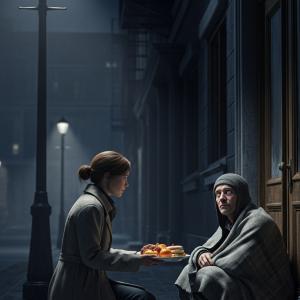The house was suffocatingly quiet. Hours after the last of the mourners had departed, the scent of wilting lilies and catered food still hung heavy in the air. For Grace, the silence was louder than the forced, somber chatter of the memorial service had been. Her mother, Eleanor, was gone. And with her, gone was the relentless, crushing weight of her disapproval.
Grace stood by the large bay window in the living room, looking out at the manicured garden her mother had meticulously controlled, just as she had controlled everything else. A strange and bitter cocktail of grief and relief churned within her. She was a celebrated artist, her work hanging in galleries from New York to London, but in this house, she had always been a disappointment. A reckless dreamer who had squandered her potential on the “unstable” and “frivolous” pursuit of art.
Her brother, Matthew, approached her, his lawyerly suit still immaculate, his face a mask of appropriate sorrow. He was the golden child, the one who had followed the safe, pre-approved path to a partnership at a prestigious law firm. He placed a hand on her shoulder.
“She was a difficult woman,” he said, his voice laced with a condescending pity that set Grace’s teeth on edge. “But she loved you, in her own way.” It was the same hollow platitude he’d been offering for years, a neat and tidy summary for a relationship that had been anything but.
Grace said nothing, just shrugged off his hand. The truth was, she had never felt a drop of that love. Her entire life had been a battlefield, every painting, every exhibition, every success met with Eleanor’s sharp, cutting criticism. “The composition is derivative, Grace.” “This color palette is dreadfully sentimental.” “Another glowing review? The critics must be getting soft.” Never a word of praise. Not once.
Her father, a quiet, gentle man who had long ago retreated into the shadow of his formidable wife, entered the room. He looked older, smaller, as if Eleanor’s passing had diminished him rather than freed him. He would always avoid conflict, simply leaving the room with a pained, unreadable expression whenever Eleanor began one of her critiques. Grace had always resented his silence, seeing it as a quiet betrayal.
Tonight, however, his eyes held a different kind of sorrow. He walked past Matthew and stopped in front of Grace.
“There’s something she wanted you to have,” he said, his voice raspy. He was holding an old, dark wooden box, about the size of a shoebox, its surface worn smooth with age. “She was… very particular about this. She said it was only for you, and only after she was gone.”
He pressed the box into her hands. It was heavier than it looked. Grace stared at it, a dozen different emotions warring within her. Resentment, curiosity, a familiar, childish hope she had long tried to extinguish. What final criticism, what parting shot, lay waiting for her inside this box?
Grace took the box upstairs, not to her childhood bedroom, but to a place that had always been forbidden territory: her mother’s attic study. The room had been Eleanor’s sanctuary, a place always kept locked. Grace had imagined it filled with boring financial papers and legal documents, the mundane architecture of a “sensible” life.
Her father had given her the key. As she turned the old brass knob and pushed the door open, she was met not with the smell of old paper, but with the faint, ghostly scent of turpentine and linseed oil. The air was still and thick with dust motes dancing in the single beam of moonlight from the dormer window.
The room was not an office. It was a time capsule. Against one wall were old, dust-sheeted easels. Canvases, turned to the wall, were stacked in a corner. Bookshelves overflowed not with legal texts, but with worn volumes on art history—Monet, Cassatt, O’Keeffe. This was the first shock. This room, her mother’s secret heart, was the room of an artist.
Grace placed the heavy wooden box on a small, dusty desk and lifted the lid. Her cynicism returned. This was probably full of her old, terrible report cards, a final reminder of her academic failures.
But it wasn’t. The box was filled to the brim with what looked like meticulously organized files. Lying on the very top was not a report card, but a professionally laminated article. Grace picked it up, her heart giving a painful jolt. It was the review of her most recent, triumphant solo exhibition in New York. The one from the New York Times. The one her mother had never once mentioned.
Her hands trembling, she dug deeper. It was an archive. Her entire life, her entire career, was in this box. There were clippings from her university’s student newspaper praising her graduate show. There were announcements for small gallery exhibitions she had long forgotten. There were printed-out blog posts from obscure art critics, local newspaper blurbs, and features from glossy art magazines. Every mention, every milestone, had been found, cut out, and cataloged with an obsessive, almost fanatical precision.
Then she found the first of the negative reviews. It was a particularly nasty piece from a Boston critic who had called her early work “a juvenile cry for attention.” Grace braced herself, expecting to see a handwritten note from her mother saying, “I told you so.”
But the note scribbled in the margin, in her mother’s familiar, sharp handwriting, said something else entirely.
“What does this idiot know about emotional honesty? He wouldn’t recognize true talent if it slapped him in the face.”
Grace stared at the words, her mind unable to process them. She frantically dug through the box, pulling out every other negative review she could find. They were all the same. Each one was a battlefield where her mother had fought a secret war on her behalf.
On a review that called her use of color “garish,” her mother had written, “It’s called being BOLD. It’s called having a VISION. Something this fool clearly lacks.”
On another that dismissed her work as “lacking in technical discipline,” Eleanor had scrawled, “The technique serves the feeling! Not the other way around, you pompous academic!”
This was the second, more profound shock. Her mother, her harshest critic, had been her most ferocious, secret defender. The woman who had never given her a word of praise in person had filled the margins of these pages with a furious, passionate, and unwavering belief in her talent. It made no sense. It was a contradiction that made Grace’s head spin. Who was this woman?
At the very bottom of the box, beneath a laminated feature from Artforum, was another, smaller box. This one was made of inlaid rosewood and was locked with a small, tarnished silver keyhole. This felt different. More personal. More dangerous.
She sat with the small box in her lap for a long time before going back downstairs. Her father was in the living room, sitting in the dark, a silhouette against the window. He seemed to be waiting for her.
“There’s more, isn’t there?” Grace asked, her voice hoarse.
He didn’t need to ask what she meant. He simply reached into his pocket and produced a tiny, ornate silver key, placing it in her palm. “She could never bring herself to give you these,” he said, his voice thick with a sorrow that spanned decades. “Her pride… her fear… it was always in the way. I should have… I should have said something. But I made a promise.”
Grace went back up to the attic, the small key cold against her skin. She unlocked the rosewood box. Inside, there was no archive, no clippings. There was only a stack of letters, tied with a faded velvet ribbon. They were addressed to her, in her mother’s hand. None of them had ever been sent.
She untied the ribbon and began to read. They were dated over a period of twenty years.
A letter from her college graduation: “My dearest Grace, I saw the fire in your eyes when you accepted your arts degree today. The same fire I once had. I was so proud, I thought my heart would burst. I almost told you. But I couldn’t. The world is cruel to artists, especially to women. You must be stronger than I was.”
A letter from her first gallery show: “I went to your opening. I stood in the back, in the shadows, so you wouldn’t see me. Your work is magnificent. It is raw and honest and everything art should be. I wanted to run up and hug you. Instead, I went home and wrote this.”
Grace read through them, tears streaming down her face. Each letter was a confession of a love that had been silenced, a pride that had been suffocated. It was a portrait of a woman torn apart by her own past.
The final letter, written only six months before her death, explained everything.
“My Grace,” it began. “I am running out of time, and I have run out of courage. I must write this down, even if I can never say it to your face. When I was your age, I was a painter. I had a scholarship to the Rhode Island School of Design. I believe I was good. But my father, your grandfather, forbade it. He said it was a life of poverty and instability. He said my duty was to marry a good man and raise a family. I fought him, for a while. But I wasn’t strong enough. I gave up. I married your wonderful father, I had you and Matthew, and I built a life of safety and security. And I have regretted it every single day.”
The words on the page began to blur through Grace’s tears.
“When I saw the same fire in you, I was terrified. Terrified that the world would break you, just as it had broken me. I thought… in my foolish, broken way… that if I could be your harshest critic, if I could prepare you for the worst, then no one else’s words could ever hurt you. I thought I was forging armor for you, but I see now I was only giving you wounds. I pushed you away, hoping to make you strong enough to survive without the approval you would never get from the world. It was a cruel, twisted, and terrible way to love someone. But it was my love for you, Grace. Fierce. Terrified. And so, so proud. Please, if you ever read this, forgive me.”
The letter slipped from her fingers. A sob, wrenched from a place of lifelong pain, tore through her. It was the sound of a dam breaking. The destruction was absolute. Not of a person, but of a perception. The cold, unloving monster she had resented her entire life was gone. In her place was a tragic, broken woman who had loved her in the only way she knew how—a way that had almost destroyed them both. Her father must have heard her, because he came into the room, wrapped his arms around his weeping daughter, and for the first time, they truly grieved the woman they had both loved and misunderstood.
In the days that followed, the contents of the two boxes reshaped the emotional landscape of the entire family. Grace shared the letters with Matthew. He sat in her sun-drenched studio, surrounded by her vibrant, emotional canvases, and read them in stunned silence. The perfect son, the one who had always seen his mother’s logic and his sister’s foolishness, was confronted with a truth that shattered his reality.
“I never knew,” he whispered, looking up from the last letter, his eyes wide with a dawning, painful understanding. “All those years… I thought she was so proud of me for being a lawyer. For being… safe.”
“She was, Matthew,” Grace said, her voice gentle. “But she admired me. For being brave.” It was a revelation that reconfigured their entire sibling dynamic. He was not the favored son; he was the safe one. She was not the disappointment; she was the one who had carried the torch. For the first time, he looked at his sister not with pity, but with a profound, humbling respect.
For Grace, the discovery was a creative and spiritual exorcism. The ghosts that had haunted her studio—the specter of her mother’s disapproval, the constant, gnawing need for a validation that never came—were gone. She was unburdened. Her work, already celebrated for its emotional intensity, took on a new layer of depth, compassion, and ferocious grace. She was no longer painting to prove herself; she was painting to understand, to heal, to connect with the ghost of the woman who was her biggest fan.
She began to work on a new series of paintings, the most ambitious of her career. The canvases were vast, filled with layers of color and texture, but for the first time, they incorporated text—fragments of her mother’s letters, the furious marginalia, woven into the compositions. It was a dialogue with the dead, a collaboration across time.
The exhibition opened a year later. The gallery was packed, the air buzzing with anticipation. Grace had become a bigger name than ever, the story of her mother’s secret archive having been hinted at in the art world press. She had titled the show simply: “My Harshest Critic, My Biggest Fan.”
The paintings were a triumph. They were raw, heartbreaking, and beautiful. Critics and patrons alike were moved to tears, not just by the art itself, but by the profound story of a complex, broken, and ultimately unconditional love that it told. It was a testament to the artist her mother had been, and the artist she had raised Grace to be.
The success of the exhibition was overwhelming, but it was the quiet, personal victories that meant the most. Her relationship with her father blossomed, deepened by the shared truth of the woman they had both loved. They spent hours in the attic study, which Grace now used as her own, piecing together the puzzle of Eleanor, sharing memories, and filling in the silences that had defined their family for so long.
Her bond with Matthew was reforged on a new foundation of honesty. The stilted, competitive edge was gone, replaced by a genuine, if sometimes awkward, affection. He started attending her openings, not as a duty, but as a truly proud brother, beginning to understand the value of a life lived with passion.
One sunny afternoon, Grace was back in the attic study, Eleanor’s rosewood box open on the desk. She picked up the final letter, her mother’s last words. The pain she once felt was gone, replaced by a deep, abiding, and sorrowful love. She had forgiven her. In understanding her mother’s story, she had finally understood her own.
She hadn’t just inherited an archive of her success; she had inherited her mother’s lost dream and, in a way, fulfilled it for both of them. She was no longer the lonely, defiant artist fighting for her place in the world. She was the daughter of another artist, carrying a legacy of fire and passion. She had found success long ago, but here, in this quiet, sunlit room, surrounded by the ghosts of a love finally understood, Grace had finally found peace.




